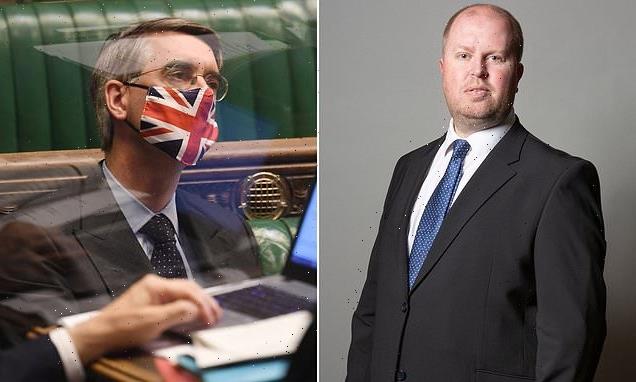Jacob Rees-Mogg tells sex-pest Tory MP Rob Roberts to do the ‘honorable thing’ and QUIT as an MP for breaching sexual misconduct rules as ministers look at changing Commons rules to allow voters to kick him out
- MP for Delyn in Wales acted inappropriately towards a man working in his office
- He was today handed a temporary six-week ban from the green benches
- Government is seeking to alter rules that prevent him being kicked out by voters
A sex-pest Tory MP was told to do the ‘honorable thing’ and quit the Commons today as he was handed a six-week suspension for breaching sexual misconduct rules.
Rob Roberts, 41, is facing efforts to remove him as the MP for Delyn in Wales after he was found to have acted inappropriately towards a man working in his office.
He was today handed a temporary ban from the green benches after a ruling earlier this week that he was guilty of ‘significant’ misconduct by making unwanted advances.
But Jacob Rees-Mogg confirmed that the Government would seek to alter rules that currently prevent voters from kicking him out permanently using a recall petition.
Mr Rees-Mogg told MPs: ‘Following a case of this severity, in which it would be honourable for a member to stand down after the withdrawal of the whip, we need to look at whether the process is striking the right balance between the defendants, protecting the confidentiality of the complainants and in ensuring consistent outcomes across different types of conduct case.
‘I can therefore confirm to the House that I have asked the chairman of the independent expert panel for his views on whether changes should be made to the current process to enable recall to be triggered.
‘In my view, any changes in this regard should be made in the most straightforward way possible and my preference would therefore be for a non-legislative solution.’
Rob Roberts is facing efforts to remove him as the MP for Delyn in Wales after he was found to have acted inappropriately towards a man working in his office.
Jacob Rees-Mogg confirmed that the Government would seek to alter rules that currently prevent voters from kicking him out permanently using a recall petition.
The Recall of Parliament Act, passed in 2015, allows the prospect of a by-election for sanctions imposed on the recommendation of the Commons Committee on Standards.
But in an unforseen loophole, because Mr Roberts appealed the standards commissioner’s ruling to an an Independent Expert Panel – which upheld the finding – he is not illegible to face a recall petition.
The petitions allow for a by-election to be held in an MP’s seat if enough local people vote in favour of one. They have previously been used against MPs guilty of misconduct and criminal behavour.
Mr Roberts was found to have acted inappropriately towards the man after splitting from his wife and coming out as gay.
He offered to apologise but denied he had breached sexual misconduct rules, arguing his behaviour – which included asking the man out for a drink – had not been ‘sexual’ but was instead ‘romantic’.
He was stripped of the Tory whip on Tuesday after the IEP ruling. But yesterday Prime Minister Boris Johnson said he believed Mr Roberts had received ‘condign’ – which means appropriate – punishment by being suspended.
Mr Rees-Mogg said it is ultimately for the House of Commons to make a decision.
For Labour, shadow Commons leader Thangam Debbonaire said she had written to Mr Rees-Mogg to offer to work with him to ‘close the loophole urgently and seek solutions’.
She said: ‘I’d like to work with him to go further and quicker and I agree that there are non-legislative solutions because in what other job could someone who has carried out sexual misconduct not face losing that job?’
She added: ‘There are workable solutions to what would be a stain on us all if the public sees someone who has carried out sexual misconduct keep their job in this place.’
Ms Debbonaire said that ‘ideally the member would do the honourable thing and resign forthwith’, adding: ‘Process should not be a shield for unacceptable behaviour, if the member does not resign, he should be subject to recall and if he is not, we run the risk of appearing as if this House does not take sexual misconduct seriously which of course we do.’
Source: Read Full Article







